Sonoran Center Hosts Denis Ouma, Advocate and Entrepreneur from Uganda
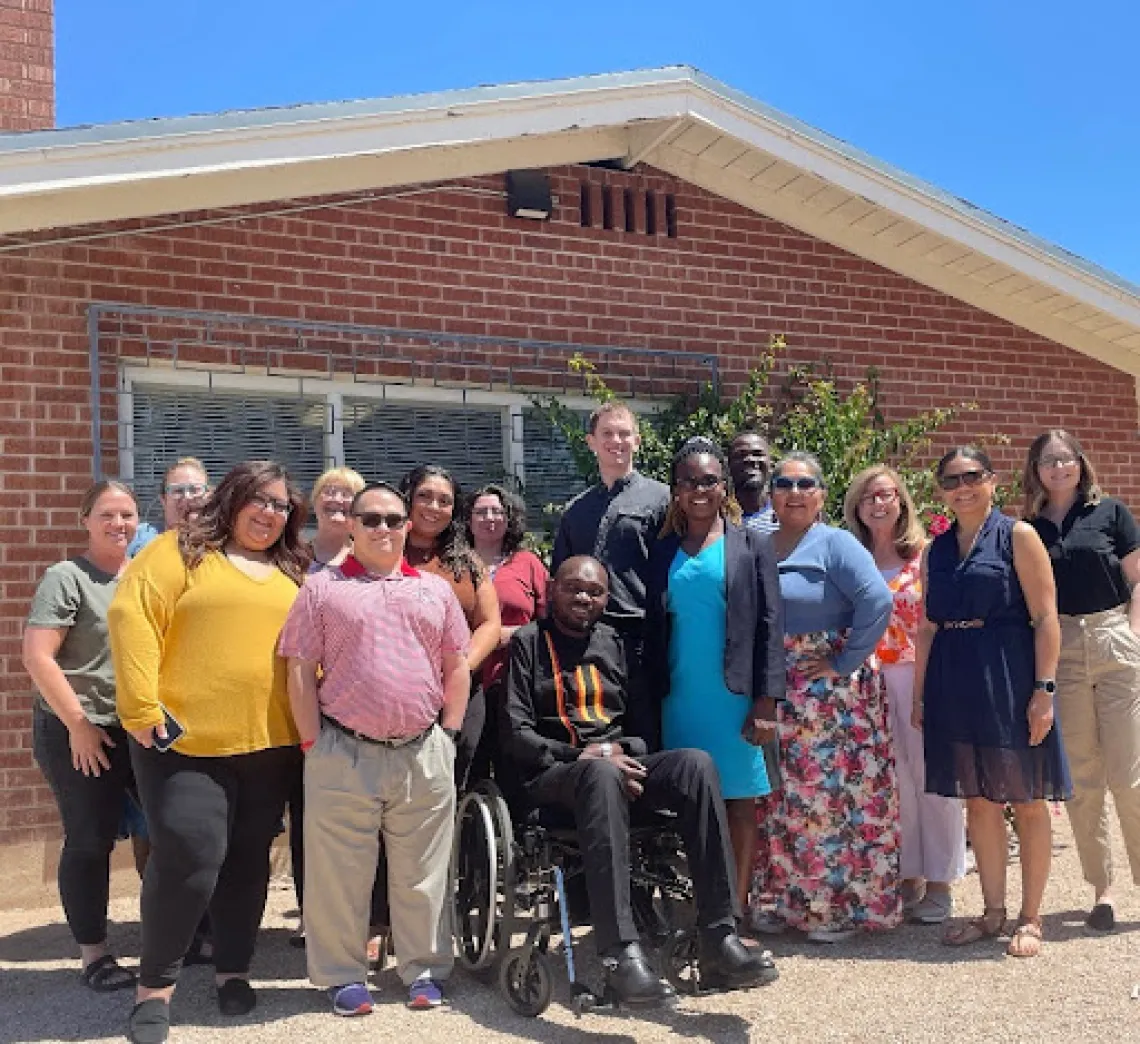
By Drew Milne
During the Summer of 2024, the Sonoran Center had the privilege of hosting Denis Ouma as part of the Professional Fellows Program on Inclusive Civic Engagement. Denis is a disability advocate and entrepreneur from Kampala, Uganda. The professional fellows program is a program funded by the U.S. Department of State for emerging leaders in Africa to exchange and implement best practices for inclusive civic engagement.
After an initial meeting with other Professional Fellows in Boston, he stayed in Tucson for several weeks, having the opportunity to share knowledge and experience with professionals at the Sonoran Center. Finally, he headed to Washington, D.C. for a conference that brings together over 150 Professional Fellows to discuss what they’ve learned and present their follow-on projects. Denis’s trip to the United States lasted about six weeks in total.
We had the opportunity to sit down with Denis and discuss the Professional Fellows Program, the disability experience in Uganda, his trip to the United States, and the unforgettable experiences he has had along the way.
Please introduce yourself and tell us a little about yourself
I’m Denis Ouma. I’m 39 years of age. I am a visiting professional fellow on inclusive civic engagement. I come from Kampala, Uganda, in east Africa. I hold a Bachelor’s of Commerce degree. I am also pursuing a masters in Disability Studies, and at the same time pursuing a masters in Corruption and Governance from Sussex University. I am a disability rights advocate, and a disability inclusion consultant. I’m a social entrepreneur, having founded Spinal Injury Support Society, as well as the Coalition for the Rights of Persons with Disabilities Activism Uganda, where we do rights advocacy for individuals with disabilities and also provide rehabilitation for spinal cord injury survivors. I am also an entrepreneur: I have founded Embellish Consults Ltd which is a corporate disability consultancy, and I’m also a certified business coach. In my free time I love to watch movies, I love to travel. I love to participate in the politics of the day, so I love political conversation, especially around issues of policy and legislation. So, it’s my total pleasure and honor to be here at the Sonoran Center as my hosts in this fellowship program.
You are participating in the Professional Fellowship Program on Inclusive Civic Engagement. Can you tell us a little more about inclusive civic engagement?
Inclusive civic engagement looks at identifying the problems within the society - the communities from where we emanate - and taking the initiative, or rather, providing the leadership - to address those community challenges. It looks at leveraging existing community resources, human resources, personnel, organization, civil society, academia, and mobilizing these resources to address the challenges.
Can you talk about some of the activities you have done while you are here?
I’ve had multiple one-on-one meetings that have been organized by my host mentor, Jacy [Farkas], meetings that enriched my knowledge as far as disability civic engagement practices, and these have ranged from employment perspectives, healthcare perspectives, inclusive health - and each of these have underscored specific initiatives that guide disability inclusive practice. I’ve met folks here at the Sonoran Center that are pursuing brilliant employment initiatives that are supporting students in the transition from academia to the workplace in formal employment, which I think is a deliberate effort that empowers individuals holistically. I think it’s a great learning platform for me, so that I can take these experiences, and go back home and implement these undertakings. But also, I’ve had a lot of fun. I’ve eaten some great food - I like the burger. I like the steak. I’ve been to a cowboy restaurant. Some really great food. Watched a football game here. I’ve had a couple road trips around town and been privileged to look at the infrastructure here. There’s been a whole lot of learning - compared to what the cities back home look like with the traffic systems, the road systems, it’s been a beautiful experience so far. I still look forward to more activities. I’ll be traveling to Phoenix in a few days for a conference to learn a lot of ideas as far as inclusive technologies and adaptations. I also will be traveling to Washington [DC] for a five-day conference that brings 151 professional fellows from across the country into a five day program where we can network and share experiences, where we can make a presentation of our follow-on projects.
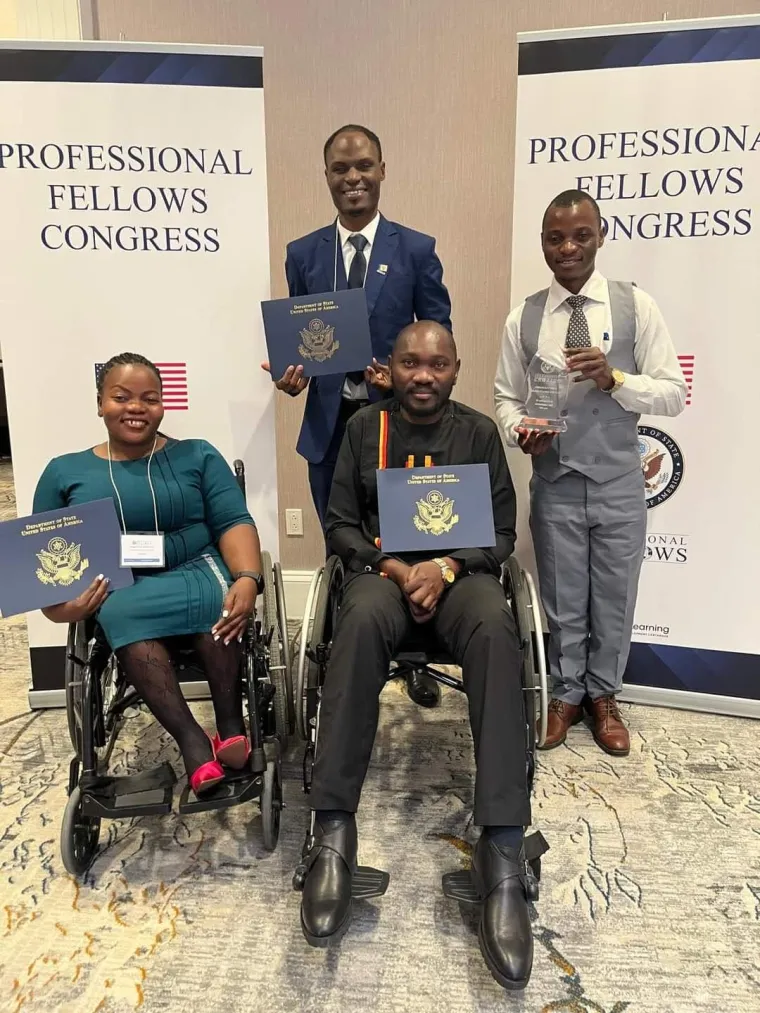
Denis Ouma receives an award from the State Department at the Professional Fellows Congress in Washington D.C.
How has your experience been in the United States and what have been some of your favorite things about your time here?
Most outstanding is the deliberate efforts by multiple stakeholders, including the state and national non-governmental organizations, among others, to address issues around disability inclusion. From progress around infrastructure, physical environment, accessibility - it’s incredible. It’s been a great eye-opening experience just to be able to navigate around the physical environment. It’s really accessible. I’ve been delighted to look at the infrastructure and development in the United States. The road network is amazing. The people - the people are great. I’ve been in several meetings, one on one meetings, with multiple participants. The people are great, and the people then make different initiatives around inclusive health, inclusive education, inclusive employment. It’s been a great learning experience and I’m still learning. I’m looking forward to initiating these brilliant undertakings back home in Kampala.
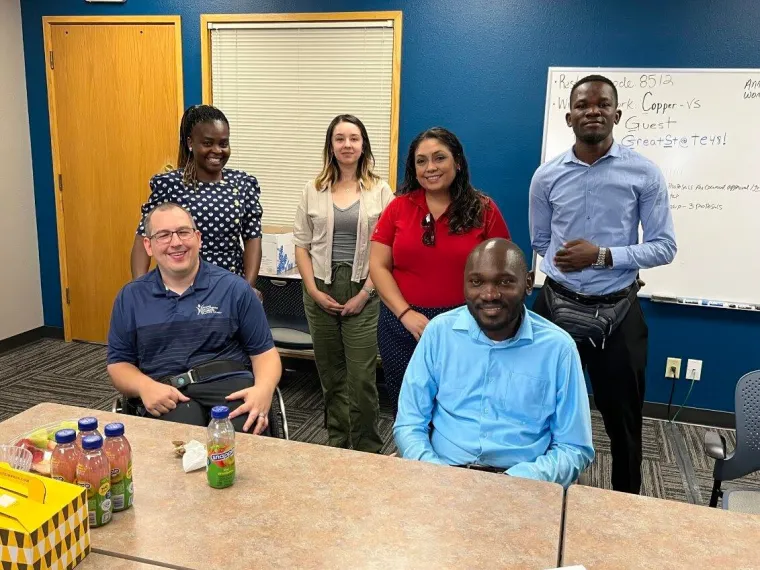
Denis Ouma (2nd from right) and support staff Stella (right) and Allan (2nd from left) visit Jason Snead (left) at the Arizona Developmental Disabilities Planning Council, accompanied by the Sonoran Center’s Ava Gutierrez and Celina Urquidez (center left, center right)
Can you elaborate on some of the differences in disability support between the United States and Uganda?
There is an acute distinction in policy implementation back home versus here. By that, I mean I clearly see a lot of difference in how, for example, the Americans With Disabilities Act has been brought out of paper to impact peoples’ lives. And this is visible. It’s visible by how much individuals with disabilities have transitioned from school into employment, and how there are a lot of efforts for people with disabilities to have health care support systems. I think there’s a great difference, because back home we have laws, disability specific legislation, specifically the Persons with Disabilities Act of 2020, which has multiple provisions aimed at making the lives of people with disabilities better. But much of those written pieces of legislation pretty much remain on paper. There’s a lot there that needs to be done, and that begs the question on us advocates and activists to speak more, be more resilient, commit more time, more resources, mobilize more, better, strategize more, and really find the problem and act on that to come up with strategies that are more efficient insofar as demanding government action is concerned so we can achieve this legislation.
Was there anything about your stay here that has surprised you? That you did not expect?
The surprise met me at the airport, where I saw a lot of intentional support systems and structures for people with disabilities. Right from the onset, it’s very visible. Not just the infrastructure, but the support personnel, the accommodations present at the airport, the equipment, directions, signage, that is expounded out of the airport through the road systems - there is a great effort being deliberately put in place to support people with disabilities. It’s amazing.
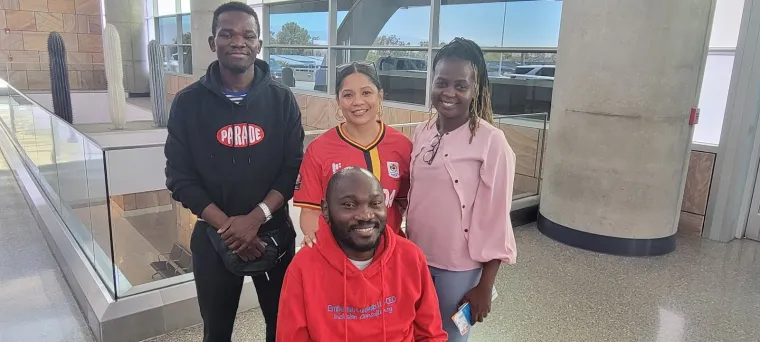
Denis Ouma (front), with Sonoran Center director Jacy Farkas (center back row) and support staff Allan (left) and Stella (right) at Tucson International Airport
Can you tell me more about your disability rights advocacy and entrepreneurship in Uganda?
As a disability rights advocate, I’ve actively been involved in the amendment process of the Persons With Disabilities Act of 2020. That was emanating from the 2006 PWD Act which was brought into law after Uganda ratified the UN Convention on the rights of persons with disabilities in 2006. Henceforth there were ongoing efforts from civil society and disability rights activists to try and bring on board best practices adopted from global pieces of legislation. We mobilized colleagues - persons with disabilities. We made presentations before the committee on gender, labor and social development in parliament on what we thought were best practices in inclusive health, education, and accessibility, among others. So we mobilized about 300 folks to petition the president, because despite our presence at the committee of parliament, not many of our ideas had been sufficiently adhered to. So we demanded better, demanded more, asked the president not to assent to the bill until our specific demands had been addressed. A lot of advocacy there.
I’m also the national chairperson for the persons with disabilities league of the Forum for Democratic Change political party, which is one of the leading opposition parties in Uganda. And our role is to promote an alternative policy agenda, and as the chairperson for the Disability League we are willing to provide insights into alternative policy agenda that pursues disability inclusion to our members of parliament who then present them on the floor of parliament. Those are some of the platforms that we use. We are also pursuing leadership groups on inclusive climate initiatives. We think that persons with disabilities are one of the vulnerable communities that are disproportionately impacted by climate change. Given the dynamism surrounding disability, the multiplicity of negative and adverse effects on individual disabilities across the country, and being that Uganda is one of those countries that is affected every year, twice a year, by heavy flooding, mudslides in the mountainous areas, so we think that incorporating issues of disability inclusion in climate action initiatives, action, and programming is extremely important. So, those are some of the platforms that we use.
I’m also an entrepreneur. As an entrepreneur, I am a farmer. I keep some birds and rabbits. Then of course, Embellish Consults Ltd which is business coaching and advisory related to corporate disability inclusion consultancy. This is for academia, government, non-governmental organizations, and the private sector.
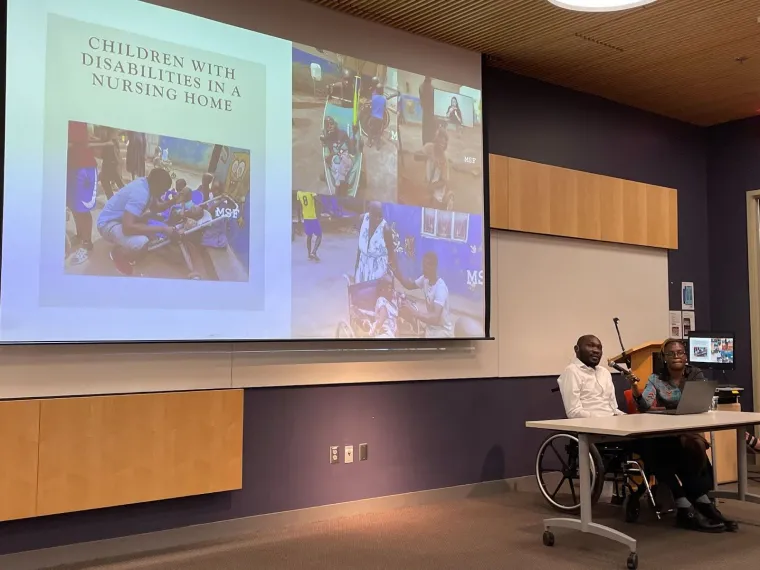
Denis delivers a presentation on the state of disability supports in Uganda
How did you get involved with the Professional Fellowship program?
Part of the work that I do in disability rights advocacy directly feeds into what the Professional Fellows Program seeks to achieve. Which is why, of course, using social media, we came across the advertisement, calling for interested parties who are doing work back home in relation to civic engagement, and who are seeking opportunities that can then further develop their skills and expertise in areas of disability civic engagement. So it piqued my interest. I did an online application, and of course I was asked what it is you are doing, how are you doing it, what you hope to achieve by your 5 week stay in the fellowship in the United States, and then what do you hope to do after the fellowship. It’s a competitive program process. I also proposed a follow-on project after the fellowship experience. The follow on project seeks to build the capacity for university students to self-advocate in their academic institutions, raise awareness of their rights and potentials, and engage the university administration to initiate or adapt or review their policies on disability inclusion to enhance best practices around inclusive education. I had interviews and here we are.
It is great that you are taking the knowledge from this program and putting it directly back into a tangible project.
It’s not just a requirement of the fellowship, but it directly feeds into our ongoing initiatives back home. Because I am a strong believer that young people with disabilities are where the future of advocacy lies. By being intentional about building their capacity, by tapping into that resource of individuals at the university, build their capacity holistically in education, success, personal development and growth, as well as career guidance, gives them a pretty clear picture of what their potentials are, what their entitlements are, their rights, as provided by the law, they can then leverage these capacity building sessions to become better advocates long after we are gone. I think that’s where the future lies.
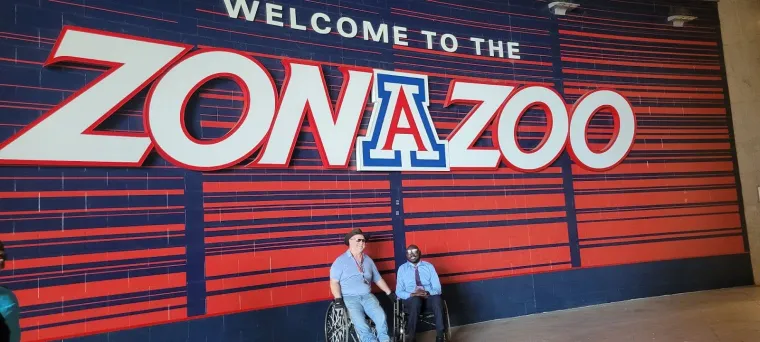
UArizona adaptive athletics director Pete Hughes (left) and Denis (right) at ZonaZoo, the UArizona official student section and ticketing program for UA Athletics.
What are some of your favorite things about the work you do?
I’m extremely passionate about issues of activism and advocacy. Passionate because of my own personal story. Sixteen years ago I was involved in a road accident from which I sustained a spinal cord injury. As a result, I became quadriplegic. I was put in a wheelchair, was bedridden for a couple of years. I was denied an education at the start. I couldn’t get a job. We sought redress from the courts of law, being denied an inclusive education, being denied job opportunities because of our limitations. So, it’s complementary of my own experiences that have inspired my actions. It is my belief that, out of my lived experiences, like with disability, I can make a direct contribution. This is where my passion is derived.
Along the way I get to meet lots of people, with and without disabilities, across multiple spheres as we connect to other communities. I’m extremely passionate and getting to learn from other peoples’ lived experiences or academic expertise or professional expertise.
What are some lessons you have learned, if any?
The biggest lesson I’ve learned over the years is that patience is a virtue, and it’s not very common. It’s one of those attributes that allows time for one to get a fair observation of the situation at hand. So I think patience is a good lesson. Of course, it grows over time, and I’m still growing.
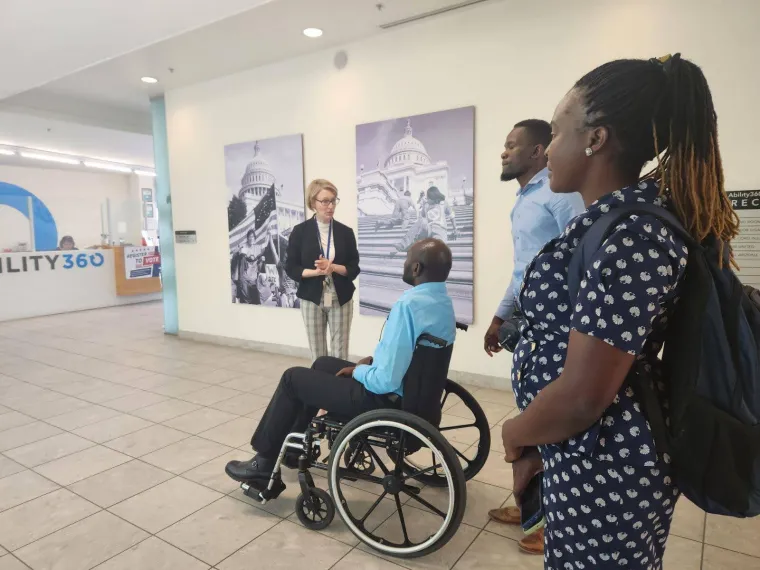
Denis visits Ability 360, a center for independent living, in Phoenix.
Do you have any advice for people who want to get into disability advocacy?
My biggest advice is really that advocacy really is everyone’s responsibility. It’s not just for people with disabilities. Because every human born alive with or without disabilities could be a candidate for disability at some point in their lives, whether due to accident or chronic illness or old age! At some point in an individual's span, most will need some kind of support. So everybody should be an advocate for disability rights. So, it’s collective responsibility across all spheres of the social, economic, political, academia, all stakeholders, everybody needs to get on board and become a keen advocate for disability rights.
It reminds me of the concept of Intersectionality, that virtually everyone has aspects of their identity that are marginalized in some way, and we can only advance by lifting each other up.
I couldn’t agree more. And there are different aspects to disability, like religion, ethnicity, economic standing, race, sex, gender, issues that reach across the issues of disability. These complexities need to be paid attention to, they make disability unique.
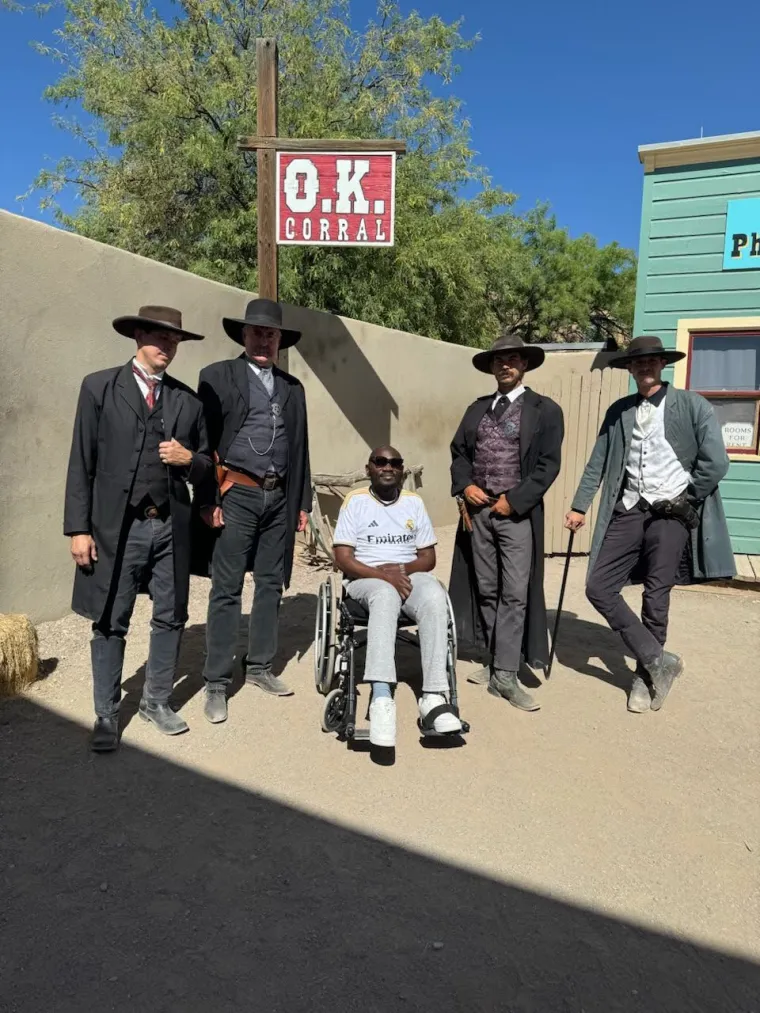
Denis (center) and actors at the OK Corral in Tombstone, AZ.
Is there anything else we have not talked about that you would like to mention?
Yes. Part of this fellowship program is out of our interactions with our host mentor, in this case Jacy [Farkas], we then get to write an application to program organizers to have our mentors visit Kampala, Uganda, so that they can further build my capacity, our capacity to a point where we can implement our follow on project, in this case building the capacity of students at higher institutions of learning to self-advocate, engage the university administration to review their disability policies as well as the universities and higher institutions council to review their their act such that they are better disability responsive and specifically provide for universal design for universities to adopt. So, I am looking forward to having our host, our mentor here from the Sonoran Center visit Kampala for our follow-on project, which we are very excited about.
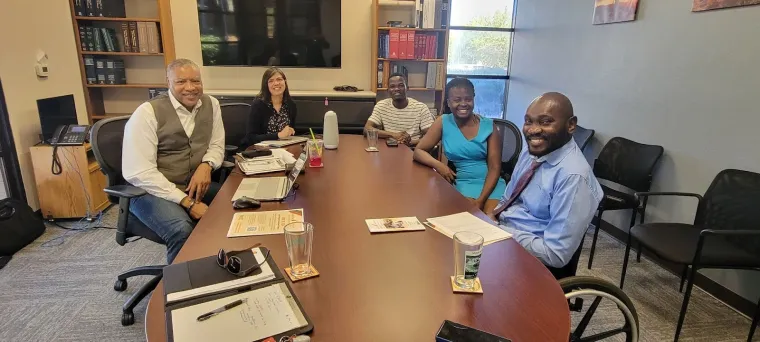
Denis meets with Renaldo Fowler (left) and Natalie Luna Rose (second from left) at the office of Disability Rights Arizona.
